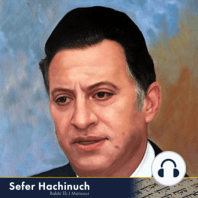20 min listen
Misva #16: Breaking a Bone of the Korban Pesach
FromSefer Hachinuch
ratings:
Length:
20 minutes
Released:
Aug 17, 2021
Format:
Podcast episode
Description
The Torah commands in regard to the Korban Pesach, “Ve’esem Lo Tishberu Bo” (Shemot 12:46) – that it is forbidden to break a bone of the sacrifice. As long as the sacrifice is Tahor (pure), and has not been exposed to Tum’a (halachic impurity), it is forbidden to break any of the bones, and one who does transgresses this prohibition and is liable to Malkut (lashes). The Sefer Ha’hinuch’s discussion of this Misva has become one of the most famous passages in this work, as therein he establishes a fundamental principle regarding the Torah’s commands and religious life generally. He begins by explaining the reason for this command, writing that people of stature would not break the bones while eating meat. This would be done by paupers, who would not often obtain meat, and when they did, they made a point of eating every tiny morsel, and even breaking the bones to ingest the marrow. Pesach celebrates the miraculous Exodus from Egypt, when we rose to the exalted stature of “royalty,” becoming G-d’s special nation. As such, we must conduct ourselves in a regal manner, and the Torah therefore forbade breaking the bones of the sacrifice which celebrates this event. Eating the Korban Pesach in a manner resembling noblemen and dignitaries will implant within our minds and hearts a sense of our nation’s unique stature, and so the Torah required eating the sacrifice the way wealthy noblemen would eat their meals. The Sefer Ha’hinuch proceeds to address the question that he anticipates being asked by his son – for whom this book was written – upon reading of all the Torah’s commands which have this same purpose, to emphasize the theme of royalty on Pesach. (Previously, the Sefer Ha’hinuch had explained that commands such as the requirement to specifically roast the meat of the Korban Pesach, and the prohibition against bringing its meat to a second location, are intended to impress upon us our regal stature.) Why, one might ask, was it necessary for the Torah to issue a whole series of commands to achieve the single purpose of emphasizing our royal stature as G-d’s special nation? Why wouldn’t just one command suffice? The Sefer Ha’hinuch famously answers this question by formulating the counterintuitive principle that people are affected by their actions. We generally assume that our feelings and motivations dictate our actions, determining how we conduct ourselves. The Sefer Ha’hinuch, however, writes that to the contrary, we mold our beings through the actions we perform. Repeatedly acting a certain way has a conditioning effect, bringing about a fundamental change in a person’s being. The Sefer Ha’hinuch formulates this principle by writing, “Ahareh Ha’peulot Nimshachim Ha’lebabot” – “The hearts are drawn after the actions.” This concept is developed also by the Ramhal (Rav Moshe Haim Luzzatto, 1707-1746), in his famous work Mesilat Yesharim. He writes, “Ha’tenu’ah Ha’hisonit Me’oreret Et Ha’penimit” – “the external action awakens the internal.” The way we act has a profound impact upon our beings. The Sefer Ha’hinuch proceeds to present two opposite examples of how this concept works. First, he writes, a sinful person can change by involving himself in Torah and Misvot, even if he does so insincerely, not for the sake of G-d. The Misva acts that he performs will affect his soul and eventually lead to positive change. Conversely, the Sefer Ha’hinuch writes, even a completely righteous person faces the risk of spiritual decline if he involves himself in what the Sefer Ha’hinuch calls “Debarim Shel Dofi” – meaningless or wasteful activities. No matter how great a Sadik a person is, inappropriate conduct will impact his soul and cause him to drastically fall from his state of piety. On this basis, the Sefer Ha’hinuch explains the Gemara’s famous statement cited in the name of Rabbi Hananya Ben Akashya: “The Almighty wished to bring merit to Israel, and He therefore made for them an abundance of Torah and Misvot.” The conventional reading
Released:
Aug 17, 2021
Format:
Podcast episode
Titles in the series (100)
Misva #8: Leaving Over Meat of the Korban Pesach: Daily Sefer Hachinuch - Brought to you by itorah.com by Sefer Hachinuch
